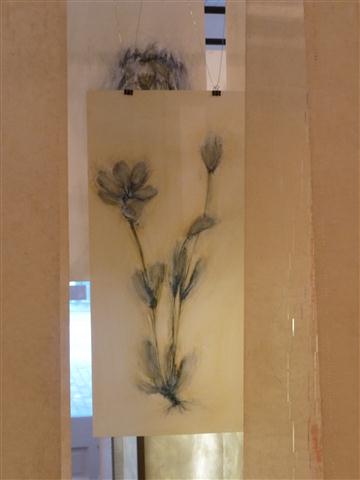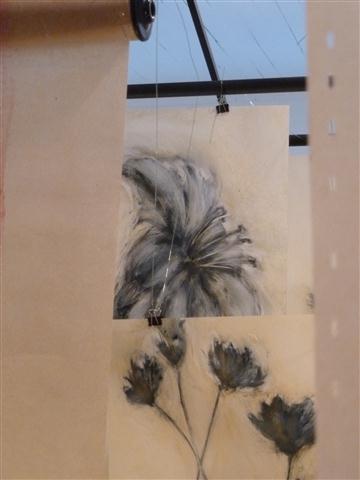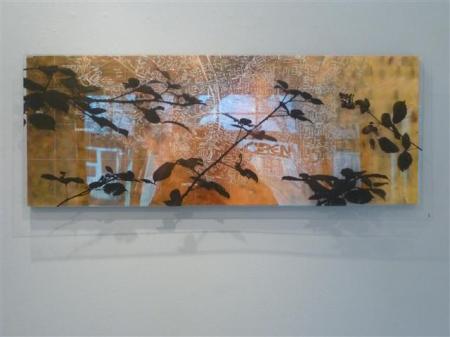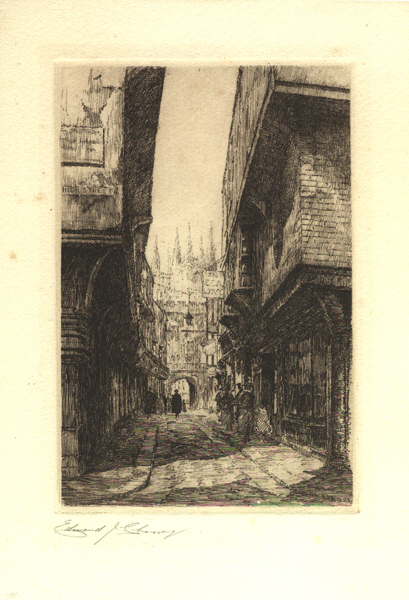
I set the house alarm and left, locking the door behind me, then realized that I didn’t have my camera.
I’ve walked the dikes so many times now, I should have them in my mind by memory, but I don’t. I don’t seen to have visual memory, funny enough, and I keep trying to record what I see either in photography or paint so that I don’t forget. It was getting warmer out by the minute and I made a conscious decision to leave it at home. I would walk faster, and anyway, I’ve already photographed everything thirty times. You’d think I’d already had the ultimate image, but no…. it’s always the penultimate.
And so there I was, on Sunday morning, walking in Paradise.
There were very few cars in the lot which was a good thing, because in this unusual heat wave, parking under one of the grand willows at the entrance to the dike walks, there is a large pool of shade and there was one parking spot left, right up by the big concrete dividers that delineate the edge of the lot.
I extracted my walking poles from the trunk, locked the car and set out. There wasn’t a human in sight.
Without the camera, I was able more acutely to hear myself and the birds.
I’ll always remember asking Mom if she could hear the birds that were chirping loudly, a flock having chosen her back yard for an early evening town-hall meeting. “Birds?” she asked, puzzled. “Hear them?” She strained to listen. “Are there birds” She shook her head. She couldn’t hear a single peep.
I vowed to listen to them while I could and here, early morning there was a leading edge symphonic composition of unrelated tonal sounds going on with each orchestral section doing it’s own thing.
I don’t think I’ve ever heard so many different birds competing in a battle of the bands before. There was a persistent, overriding one going “Chi, we,we,we,we” . There was a beautiful melodic one, about sixteen notes long, whose tune I could not imitate nor remember. There was a ticking one going, “chi, chi, chi, chi” and a starling imitating a chickadee with a throatier version of the “dee, dee, dee” sound.
When a person pays attention with all one’s senses, it’s amazing what there is to hear and see. And smell also. There was a decided scent of mown hay permeating the air with an attenated sweet manure smell behind it. It had been spread more than a month ago and the awfulness of it had sunk into the ground, nourishing it, leaving the hot earth with this pleasant farm smell.
Without the camera I beetled ahead at a rapid pace, which is what I should be doing most days but never do if there’s something to photograph. But I havn’t been serious about walking as I should, so I was happy to halt, catch my breath and watch two birds grasp the same tall branch of a pink-flowered shrub. They were the size of bush-tits but all brown and they were swinging around the twig like a pair of acrobats.
When I resumed my walk, I reflected that not having a camera forced me into having conversations with myself. I thought it might be a great exercise to go home and paint what I saw today.
I dismissed the problem of colour. I had that down pat – the brilliant summer sky, a mix of cerulean and French ultramarine; The far mountains, a wash of French Ultramarine and closer ones simply a deeper version of the hue; the trees, a mix of viridian and burnt sienna; the sunnier greens mixed with a lemon yellow and a sap green.
It was the composition that I couldn’t carry with me – the way the shapes nestled together, the way the shadows defined the shape, the rhythm and flow of it. I tried to memorize one or two.
There was the way the dike path split the marsh grasses like a bolt of lightening diminishing to its pointy end far off in the distance, only to be stopped in the mid ground by two small poplars and the heron tree. Overpowering everything were the pure blue mountains, receding in distinctly shaped layers of progressively lighter hue.
There was the way the dike sweeps down into the farm lands where the blueberry fields are ripe and ready. At the edge of these, the windbreak is made up of mid sized shrubs entangled with blackberry and wild rose. It’s an image full of curves and warm, golden grasses.
As I approached the Neames Road bridge, I tried to memorize the shape of it – its four creosoted posts on either end, the white railing with three tiers, the water flowing underneath, everything reflecting in the water with the addition of a good swig of sky and a dollop of a single cloud floating in the water. Sounds like a blueberry float with whip cream on top!
On the way back, the sun was coming straight for me, as were a number of late starters their dogs or their children in tow. A few runners sped by, coming and going. I concentrated on trying to find word equivalents for the bird songs and repeated them as one of my memory exercises. I wasn’t sure whether I would be racing for the brushes or the keyboard when first I got home.
Chi, we, we, we, we, I was repeating to myself as I was interrupted by a “kitty-wake” sound but I was sure it wasn’t a kittiwake because there were no gulls around. I stopped to listen and joined a conversation unfolding before me.
A middle-aged woman in a broad raffia hat sporting two braids down to her shoulders had stopped two petite Iranian ladies more or less appertaining to a leash-free teacup-sized dog with a tiny bow on it’s head.
“There’s a coyote hanging about. Several people have seen him this morning,” counselled the braided woman.
“Oh, we’ll be okay,” said one of the Iranians, smiling as they continued to saunter along. They clearly had not understood, neither the message nor the import of it.
“It’s your dog. The coyote will eat your dog. It’s like a wolf,” insisted the woman with the braids.
The Iranian women stopped, trying to make reason of the message.
“You had better carry your dog,” insisted Mrs. Braid.
Their eyes popped and one of them let their mouth hang open in horrified understanding. They both nodded. The little muffet was called and one of them scooped up the handful and tucked it close to her breast.
“Oh, look,” cried Mrs. Braid. “There are two birds chasing an eagle.”
It broke the conversation and everyone looked. Two small birds, likely the size of robins or starlings were bearing down on the eagle high above the poplars. One flew in so close it could have dropped six inches and ridden on the eagle’s back without having to do any wing flapping himself.
The bald-headed eagle was angrily chastising his pursuers with that ki,ki wake sound . I had at least matched one of the choruses from the bird symphony, now.
Mrs. Braid and I talked then about having seen coyotes and bears and other wildlife. We traded stories for quite a long moment before she announced that she had just retired from working as an art teacher.
“How coincidental!” I said, very happy with our conversation that just flowed. I explained my connections to art. Then I explained what I was doing to integrate myself into the art community as a newcomer, inviting groups of artists to salon-like gatherings so that I could get to know them and they, me.
“Would you like to come to one sometime?” I asked.
“Oh, I would love to,” she answered and started to cry. Not the sobbing kind, but the sniffly, trying-desperately-not-to kind, with an index finger reflexively wiping away moisture from the side of her eyes.
“Oh, I’m so sorry,” she apologized, dipping her head so that with the shadow of the had, I could not see them. “It’s so recent. I’ve just put my husband in a residential care facility this week. Alzheimers. ” She struggled to force the tears back into her eyes.
“Oh, I’m so sorry,” I replied, with a look of concern for her.
“I’m only fifty-five. He’s only sixty-four. For the last four years, I haven’t been able to get out. It’s the first time I’ve had any time to myself. I’m not used to having time. Not that I’ve just left him there, though. I go every day between six and ten at night. That’s when I can be most useful, getting him to bed. Sometimes he recognizes me. Mostly he doesn’t. And I’ve never had time to go anywhere, not even grocery shopping, because he had to be watched. He didn’t understand anything anymore. While we were out walking, he would see a house and construct a story around it. He would think it was ours and we had renters. He would want to climb a fence to get into the place to see if they were treating it properly.”
“Like a two year old,” I sympathized.
“Yes, exactly,” she replied. “I couldn’t leave him for a moment, and I couldn’t take him anywhere. But finally, I stopped being humiliated and embarassed by the situations he got me into.”
Her situation came out in a torrent. The relief that she felt in finally having the burden of his care lifted from her shoulders alone and shared with the health system was huge, but at the same time, she felt guilty. A new round of tears escaped from her eyes. She was really in quite a fragile emotional state.
I thought to myself, I guess this was the reason I came out to the dike so early this morning. It was a bit like this chance meeting had been engineered by the invisible and all powerful Higher Power of the universe.
I tried to distract and reassure her. I told her about caring for my mother in a similarly senile state, though her husband seemed to be far more difficult than my mother had been. I told her about the drawings I was doing about feelings. How I had originally pounded marks onto the paper, in anger, and beat away the frustration in long, attacking strokes. I told her about standing in front of my paints and closing my eyes to see what my feelings were and then finding colours that matched and images that expressed those states.
She had pulled her emotions together and stuffed them back in their box. She said, “It’s the first time I’ve been back on the dikes. My husband and I used to walk here. I’ve been frustrated and lonely and feeling guilty to be enjoying all this beauty, this paradise. I had no idea I might talk to you or anyone. It’s so strange. I think I must have been sent to meet you here today. It is as if it was meant to be.”
The similarity of our our situations and our thoughts amazed me. I said so.
Again, I invited her to join up with us at one of our artist groups.
“You know, you will not feel out of place. We’ve all had our griefs. Elizabeth’s mother has died of Alzheimers just recently and she cared for her daily for several years. My mom was getting senile and slipping deeper and deeper in to geriatric states of confusion, so I understand perfectly. Mrs. Stepford is going blind, and Thelma is desperately trying to get her granddaughter out of the Ministry’s foster home care system. Her daughter is too sick to look after the child. You’ll feel right at home. And you don’t have to wait until I throw another potluck. Just come for tea.”
It was time to be getting on. We exchanged names and promised to be in touch. We said goodbye and I walked hastily back home, this time regretting my camera very much.
A young family with two children under the age of six riding bicycles and parents afoot, pushing a baby in a stroller. The mother’s shadow was imprinted on the gravel walkway in perfect silhouette. Just in front of her, the four year old was peddling furiously on her red an blue bicycle with training wheels. Her shadow too was at a perfect ninety-degree angle, flattened upon the light gravel path. The moving shadow’s legs pumped up and down perfectly, the spokes were more noticeable here than on the bike, turning round and round like some fair ground ride.
It wasn’t long after that I got into my nice cool car, hiding as it was, under the willow tree, and made for home. I went straight for the computer before I could forget Mrs. Braid’s last name. I took the information and put it in my address book immediately, then phoned up to leave a message.
Someone on the other end picked up. I hadn’t thought she could get home so fast.
“Mrs. Braid?”
“Speaking,” the voice replied, quite formal.
“Mrs. Braid, it’s Kay here. I just met you on the dike a short while ago. I didn’t think you could get home so fast.”
“What did you say your name was? Kay? Kerrer? Is that right? I just looked up your number and was about to call you. Is this the right address. I just had the phone in my hand to call you…. I think we were destined to meet.”











